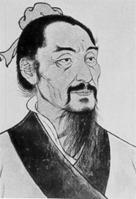|
Born in the State of Lu (in today's Shandong Province), Mo Zi was a thinker, political activist, educator and scientist during the early Warring States Period (476-221 BC).
He studied Confucianism when he was young, but later he rebelled against the philosophy for its excessive emphasis on elaborate celebrations and funerals. So, before he reached the age of 30, he began to form the school of Mohism to strongly argue against Confucianism and Taoism.

Mo Zi managed to attract a large following with his ideas such as "impartial love" and "non-attack" elaborated in his 10 core theses. He and his followers also formulated China's first explicit ethical and political theories and advocated meritocracy and the public good.
But Mo Zi first began his career as a carpenter and he was known for his exceptional skills. He had invented many farming machines and military contraptions.
He even designed a wooden eagle that, it is said, could really fly. People still believe that if Mo Zi hadn't later switched to study and dissemination of his philosophical ideas, he could have been remembered today as a legendary carpenter like his contemporary, master carpenter and artisan Lu Ban.
In order to pursue his pacifism, he traveled to many states and tried to dissuade rulers from their plans of conquest and to persuade them of his concept of "impartial love."
In the State of Chu, the well-known artisan Lu Ban had invented a wheeled, mobile "cloud ladder" that could be used to attack towns fortified with tall walls.
The Chu king planned to use this siege engine to launch an attack against the State of Song.
Learning the news, Mo Zi walked 10 days and nights, rushing to the State of Chu to meet the artisan. He told him that the planned war would cost many lives and should be called off. Meanwhile, he said the new war machine was not invincible.
Lu Ban didn't believe Mo Zi, so Mo challenged him to a war game in front of the king -- the "cloud ladder" would be used in the attack on a town and Mo Zi would defend it with his own devices and strategies
After several rounds, the famed artisan failed to break through Mo Zi's defenses. Then, he said: "I have one more arrangement that can definitely conquer any town."
Mo Zi replied: "I know what's on your mind. You want to kill me. You believe that once I am dead, there will be no one to defend the State of Song.
"But, you are wrong. I have already sent a dozen of my best students to the State of Song to teach them how to strengthen their defenses and use my stratagems."
Seeing that he would fail, the Chu king reluctantly called off the planned attack.
But Mohism received a fatal blow during the Qin Dynasty (221-206 BC) when the ruler adopted legalist theories and tried to eliminate all other doctrines with a "burning of books and burying of scholars" campaign.
Later, Mohism faded into oblivion when Confucianism became the dominant school of thought during the Han Dynasty (206 BC-220 AD).
However, more than 2,000 years after his death, people have again begun to study and follow some of the key principles of the great thinker. Particularly, his thoughts of "universal love," his promotion of a simple life and?his trenchant condemnation of "offensive war" have been revived.
Editor: Dong Jirong
Source: Shanghai Daily
|